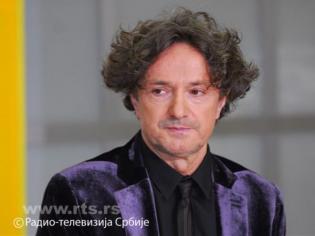While we may be having some problems at the moment, uniting the continent through economics and politics, music has the unique ability to cross borders.
In this edition of I talk, we speak with European maestro Goran Bregovitch. A musician from the former Yugoslavia, he is at home with all styles of music, from classical to electronic. He composes scores for films and even penned a song for Serbia’s Eurovision entry in 2010.
Your questions, for Goran Bregovitch.
Alex Taylor: “I hope you are comfortably seated for some quick questions and quick answers.”
Natacha, Belgium:
“I’m Natacha from Brussels, you’re one of the major representatives of Balkan music. Do you think that with your huge popularity in Europe, you’ve contributed to the perception people have about the Balkans?“
Alex Taylor: “The theme of national identity is so broad, how does it relate to music?”
Goran Bregovitch:
“Musicians aren’t able to change the world but we can give the illusion of making it a better place. But to illuminate a street, even that makes the world a better place. All the little lights help! You see, music isn’t a necessity, it’s a bit like salt. You can eat without it but food tastes much better with it.”
Alex Taylor: “It is much better with salt! OK a second question for Goran Bregovitch.“
Pauline, Belgium:
“My name is Pauline and I have Gypsy origins. Let me ask you a question, Mr Bregovitch. I love your music but I just don’t understand why Romanies never get any credit?“
Goran Bregovitch:
“In the history of music it’s difficult to find a composer who hasn’t been influenced by Gypsy music. There is a list of classical composers who have dedicated their works to Gypsy music. I myself have always been greatly influenced by Gypsies.The name of my most recent record, which will be released in late February is called “Champagne for Gypsies” and I think that one day, not too far in the future, Europe will acknowledge the mark that Gypsy culture has left. Mother Teresa had Gypsy blood, as did Elvis Presley, Charlie Chaplin and many more.”
Alex Taylor: “OK, perfect, third question please on I talk.“
Daphné, Greece:
“Hello my name is Daphné, I come from Greece. I’m a musician, studying jazz, and I wanted to ask your opinion on how to become a good, international musician? I want to make quality music like you and don’t want to be forced into making rubbish commercial music to survive.”
Alex Taylor: “Your answer please Goran Bregovitch.”
Goran Bregovitch:
“The good thing about music is that it’s also a language. Scientists say it was humanity’s first language. That’s why we communicate so easily through it. If you speak through music, it’s easy to communicate. The problem is a lot of music is localised to the composers own culture and you have to resist being indigenous.
“Music comes from a much deeper place than language. You can write in a foreign language, French like Kundera, Rushdie writes in English; but a composer, if he wants his music to be real and honest, he has to go much deeper. That’s when it becomes international, but we don’t know why.“
Alex Taylor: “OK, next question for Goran Bregovitch.“
Ronald, Belgium:
“Hi, my name is Ronald. I’m from Brussels in Belgium and I would like to know if you deviate a lot from the roots where you started making music?”
Alex Taylor: “That’s exactly what you said before. Is it necessary to leave your roots?”
Goran Bregovitch:
“Not really. I started as a musician on the bar strip, so from the beginning, it was like God sent me out to have fun and do what I love doing. So I have fun, that’s what I’ve done all my life and that I think is at the very root of art. To take pleasure in what you do. Of course all music comes from tradition and I was influenced by the likes of Stravinsky, Bartok, Gershwin, Lennon and McCartney and Bono. In that fine tradition, anyone who has produced anything of quality has to let other musicians use it. A bit like Robin Hood.”
Alex Taylor: “OK! Another question.”
Rachel, Lyon:
“Hello my name is Rachel and I come from Lyon, France. I want to know if in your future Balkan music, you’ll keep using big orchestras, that, I personally find amazing. So will you continue on this path?”
Alex Taylor: “You’ve worked with many orchestras like the Paris Symphonic Choir for example. Will you continue with this?“
Goran Bregovitch:
“A week ago I played with an orchestra in Minsk, it was the Presidential Orchestra of Belarus, so yes, I play with many orchestras and it’s good because the score and the notes are always the same. The difference however, is that each culture reads them differently. I remember once in Istanbul, there was a high tenor solo in a piece. He closed his eyes and began his melody. My poor conductor, he tried to lead but it was no use. I think it’s nice to see how people from different cultures interpret scores when they have a little freedom.“
Alex Taylor: “OK another question.”
Goran, Madrid:
“Hello Goran, my name is David and I live in Madrid. I want to know when your new album will be released? Six years ago I went to one of your concerts in Florence and I’m looking forward to listening to your new songs.“
Alex Taylor: “Obviously a fan. Any scoops?”
Goran Bregovitch:
The name of my last record was Alkohol and there were two parts. The first part: ‘Sljivovica’ has been out for over a year and the second part: ‘Champagne for Gypsies’ is released in February. After that I’m composing an opera which should be complete by September 2013. These are my plans for the future.“
Alex Taylor: “So our last question is handwritten, from the European Parliament. What can we do to make classical music less snobbish? Briefly, please.”
Goran Bregovitch:
“But good music is never snobbish. I don’t believe that. Good classical music is for everyone. Everybody likes good music. Maybe snobs will listen to the stuff that people don’t know, because they want to be exclusive. But I think good music, whether it’s classical or hip-hop, can cross all borders.
Alex Taylor: “Thank you Goran Bregovitch in Paris.
See you very soon for another edition of I talk from the European Parliament here in Brussels.”
euronews.com
Τελευταία νέα
- Το 1ο Burlington Community Festival - Μια μέρα έμπνευσης, δημιουργικότητας και χαράς!
- EUROPALSO - Εγκύκλιος 27/06/2025: Απογραφή ΚΞΓ – Νέο Πρόγραμμα ΔΥΠΑ για εργαζόμενους και ανέργους – Εξετάσεις Ενηλίκων – WaterFun WaterPark – Βεβαιώσεις Σπουδών Society – Νέες Παροχές για ΚΞΓ ESB – Απενεργοποίηση κωδικών E-Europalso – Υποχρεώσεις Ιουλίου-Αυγούστου 2025
- EUROPALSO - ΦΟΡΟΛΟΓΙΚΕΣ ΥΠΟΧΡΕΩΣΕΙΣ ΙΟΥΛΙΟΣ & ΑΥΓΟΥΣΤΟΣ 2025
- EUROPALSO - Νέο Πρόγραμμα ΔΥΠΑ – Με επιδότηση €750
- EUROPALSO: Προσωπικός Αριθμός – Τι Είναι – Πως Εκδίδεται
- EUROPALSO - φορολογικές υποχρεώσεις ιούνιος 2025
- EUROPALSO: Απογραφή υφιστάμενων αδειών ΚΞΓ <75 σε πληροφοριακό σύστημα OpenBusiness έως 1/12/2025
- EUROPALSO Εγκύκλιος 13/06/2025: Απογραφή ΚΞΓ σε OpenBusiness – WaterFun WaterPark – Βεβαιώσεις σπουδών για ΚΞΓ Society – ESB Online Exams for Adults – Νέες Παροχές για ΚΞΓ ESB – Advisory Offices – Υποχρεώσεις Ιουνίου 2025
- Δωρεάν Webinar: Partners in...Creativity! Transforming EFL through Human - AI Collaboration
- 1st Burlington Community Festival: ΔΩΡΕΑΝ για εκπαιδευτικούς και μαθητές 10/5 - Ίδρυμα Σταύρος Νιάρχος




